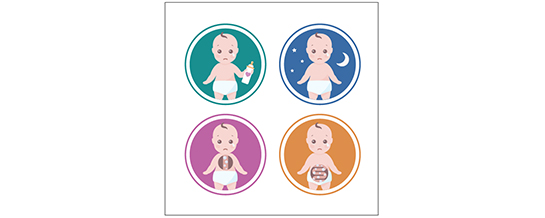How to Care for Your infant with Infantile Colic
This leaflet will provide you with information about infantile colic.

What is Infantile Colic?
Colic is a condition where infants up to 6 months of age who are not sick or hungry show repeated episodes of crying or fussiness.
What are the signs and symptoms of Infantile Colic?
Your child may cry a lot or be fussy, this could happen:
- At least 3 hours a day
- For three days a week
- For over three weeks
During the crying episodes, your infant will:
- Be difficult to control
- move his legs up
- turn red in the face
How is Infantile Colic diagnosed?
The doctor will ask a few questions about your child's health and examine your child.
Typically, infants with colic have the following criteria:
- Are up to 6 months of age
- Healthy and well
- They feed well
- Cry a lot, mainly in the evening and late afternoon
- Do not show any problems with growth
- Do not show any weight gain issues
- don't have abnormal vomiting
- do not have difficulty passing stools
- seem fine between the crying episodes
How is Infantile Colic treated?
- This is a condition that is not harmful to your baby and will go away with time
- Most babies grow out of it by six months of age
- There is no medicine for the condition. However, some drops may help a little bit
Home care advice
Caring for a baby with infantile colic can be tiring and stressful. It is important as a mother to get support from family members or friends.
Some care steps may help, such as:
- making sure the baby:
- Is not hungry, feeling cold or hot
- Has no fever.
- Changing the baby's position,
- Swaddling,
- Massage the back gently
- Put in a vibrating baby seat
- Trying some drops if suggested and prescribed by your doctor
When should I seek medical advice?
Seek advice immediately if your baby shows:
- Abnormal breathing
- Abnormal color or tone or energy levels
- Fever
- Abdominal distention(Swelling of the abdomen)
- Abnormal vomiting
- Unable to pass stools
- Blood in the stool
- Poor feeding and poor weight gain
- Abnormal movements

